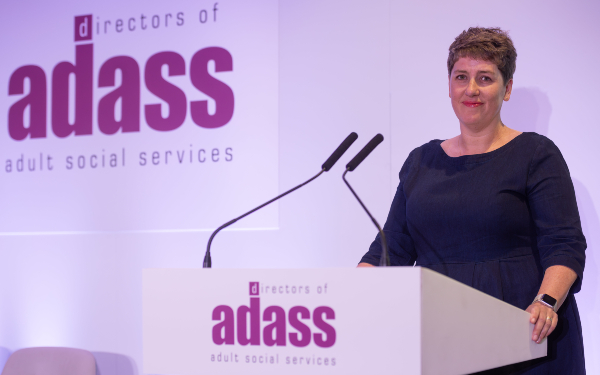
Jess McGregor, ADASS president, 2025-26 (credit: Matthew Power Photography)
The launch of the Casey Commission this week follows a long line of unsuccessful attempts to reform adult social care in England over recent decades.
This has left the sector weary and sceptical about the prospects of yet another attempt at solving its multiple problems: unmet and undermet need, inconsistent and, in some cases, poor-quality care, an underpaid and undervalued workforce, growing pressures on informal carers and the risk of some people facing catastrophic care costs.
However, for incoming Association of Directors of Adult Social Services (ADASS) president Jess McGregor, despair about the prospects for reform is the route to yet more failure.
‘We need to be hopeful and optimistic’
“I think we need to be really hopeful and optimistic that it will be successful and it’s really important that that’s how we engage with it,” says the executive director for adults and health at the London Borough of Camden, who took on the presidency at ADASS’s spring seminar this week.
“For those of us who have been around and had hopes raised by previous reviews, there is a temptation to be sceptical,” she says.
“But I think it’s really important that we put that to a side because, at the moment, as is clearly articulated by the government, this is the vehicle that is going to deliver social care reform.”
Alongside such optimism, ADASS also wants to make it harder for politicians to ignore or drop the commission’s eventual recommendations, by influencing public opinion about adult social care.
Changing the public’s view of social care
Launched alongside the Casey Commission this week was Care Can’t Wait, a new ADASS campaign designed to showcase adult social care at its best, through the personal stories of those who draw upon it.
The first face of the campaign is Abbie-Jo Lawrence, who explains, through a three-and-a-half-minute video, how her personal assistant, Dani, has enabled her to work, raise her children and have as much agency in her life as possible.
The aim is to use these human stories to connect with the public in a way the abiding narrative around adult social care – of crisis, underfunding and vulnerability – has not. The belief is that changing public opinion in this way will convince politicians to act.
‘Gloriously ordinary lives’
It’s an approach that has been pioneered by Social Care Future, an organisation set up in 2018 by people with lived experience of services, who were frustrated both by their exclusion from conversations about the sector and the lack of a positive vision for its future.
It articulated a vision of a “future where we can all live in a place we call home, with the people and things that we love, in communities where we look out for one another, doing the things that matter to us”, and of people drawing on care and support leading “gloriously ordinary lives”.
ADASS is working with Social Care Future and Frameworks UK, a consultancy that helps organisations communicate their messages more effectively, to develop more impactful public messaging on social care.
It’s a tough ask at a time of chronic funding pressures on services, exacerbated by the added costs on providers generated by the recent rise in employers’ national insurance contributions.
‘Funding story doesn’t connect with the public’
That context makes it difficult for sector bodies to focus on the positive and convey this to a public used to more negative messaging. However, McGregor says that the sector needs to ride both horses.

Jess McGregor, ADASS president, 2025-26 (credit: Matthew Power Photography)
“Our latest spring survey demonstrated that the overwhelming majority of directors are experiencing financial challenges and needing to make savings, and are concerned about the impact that is having on care. That’s absolutely true and part of the story.
“But we also know that story hasn’t, over the past 20 years, cut through and enabled politicians to make some really difficult decisions. And we know that that story doesn’t connect with people, and that people’s understanding of what social care is and its importance to all of us is really low.
“So finding ways to connect with people, which are much more about helping them understand what great social care looks like at is best, what that means to people and how enabling that is, is really important.”
Turbulent backdrop to Casey Commission
The Casey Commission has also been launched against a turbulent backdrop for the services and institutions that surround adult social care.
All English councils have embarked on a programme of reform to children’s social care services, while county councils, and small unitary authorities, are facing the prospect of being reshaped into new bodies in line with the government’s local government reorganisation agenda.
At the same time, the NHS is going through one of its periodic bouts of reorganisation, thanks to the government’s plan to abolish NHS England and halve the running costs of integrated care boards (ICBs), the health sector’s commissioning bodies.
McGregor says such turbulence in the public sector is nothing new and stresses the value of seeing such changes as opportunities, not threats.
NHS reform ‘is opportunity for social care’
For example, she says NHS reform – due to be set out in the forthcoming 10-year plan – will articulate how the health service can be reorientated around neighbourhoods, including through the creation of multidisciplinary teams, potentially involving social workers.
“The way the NHS reforms set out a vision and a roadmap for neighbourhood health will be really critical for social care reform because we’re so interdependent with each other,” she says.
“So, I think, there’s something about making sure we are leaning into all of those areas and supporting the Casey Commission to see that as a coherent whole.”
Another element of this busy picture is the government’s plan for a fair pay agreement for adult social care. Its Employment Rights Bill would set up an Adult Social Care Negotiating Body, to make agreements about the pay, terms and conditions of adult social care workers in England.
Funding impact of fair pay agreement
Given ministers’ intention to deliver fairer pay in a low-wage sector, this is likely to raise costs for providers, which would need to be met in large part by councils, along with NHS commissioners.
In the context of the employers’ national insurance contributions increase – and reports that this burden is not being met by council commissioners – the prospect of the fair pay agreement being underfunded is a significant concern for provider and local authority leaders alike.
McGregor says it is important that “the decisions around the fair pay agreement are really well informed and that we don’t end up bringing something to fruition that has unintended consequences. But that work is not happening in isolation from conversations about social care reform.”
Reflecting this, Casey has been asked to take account of the Employment Rights Bill in drawing up her first report, due next year, which will provide a 10-year plan for creating a national care service.
“What will be most limiting for the ambitions of the fair pay agreement is if we don’t have sustainable funding for adult social care.”
Return of CQC assessments
As the person responsible for adult social care in Camden, McGregor has the distinction of currently being the only director with an outstanding rating from the Care Quality Commission (CQC) since it resumed assessing the quality of council adults’ services in December 2023.
Of the 27 councils whose CQC reports have been published so far, 15 others were rated good and 11 requires improvement, with none rated inadequate.
At the spring seminar, CQC chief inspector of adult social care and integrated care James Bullion – a predecessor of McGregor’s as ADASS president – said the results showed that the regulator was “not finding the ‘disaster, crisis’ story” often told about the sector.
However, he added that there were factors beyond the quality of an authority that may be influencing councils’ ratings.
Link between ratings and deprivation
“I think we can see a bit of a correlation between deprivation and also capacity of local authorities as well,” he said. “We are planning to write an end of year report to draw out some of the issues so we can say to government, ‘there is a link between deprivation and poorer social care performance’. It’s obvious on one level, but needs evidencing.”
McGregor stresses that councils do have “agency” in relation to the quality of the services they commission and provide, which is based on “vision, values, culture and practice”, as well as resource.
However, she adds: “We [in Camden] have been really pleasantly surprised by our outcome, really proud of that. But we are also really conscious we are a particular authority of a particular size working in a particular context and we’ve always known that some of the variation in how people experience care and the outcomes they are able to achieve is connected to money.”
“If CQC is able to demonstrate that there is this relationship [between resource and performance], that will…inform conversations about how the government can help us ensure there is a really consistent offer for everyone across the country – and that everyone, no matter where they live, is able to lead that gloriously ordinary life that we all aspire to.”








